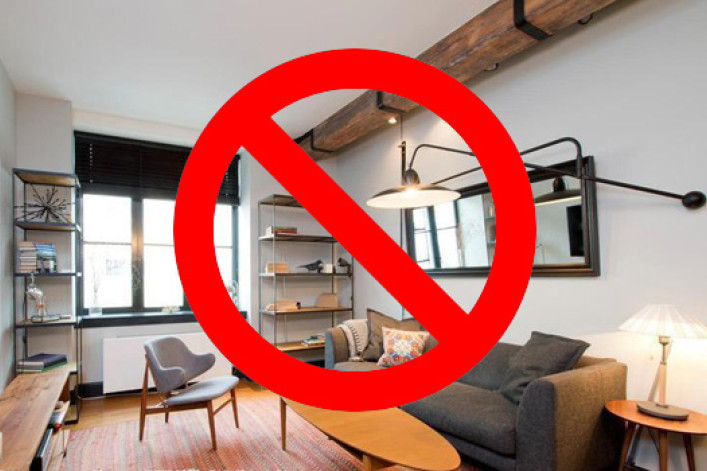Breaking the laws of NYC real estate--and what it'll cost you

It may not exactly put us in "America's Most Wanted" territory, but many New Yorkers are hiding secrets in their apartments that run afoul of the law, or at least the rules set by their condo, co-op or landlord.
The consequences for breaking the rules run the gamut, but if you violate your rental lease, you can be evicted, and if you violate the terms of your condo or co-op bylaws, you could be sued or evicted, says Dean Roberts, a real estate lawyer with Norris McLaughlin & Marcus.
That only happens in the most extreme of cases, he adds. In general, if you agree to "cure" the problem, and it can be fixed easily, you’ll get off relatively unscathed, Roberts says. If, on the other hand, you take out all the walls in a three-bedroom to mimic an art gallery--yes, this is a real-life example--that's going to turn into a complicated legal matter, he says.
Below are some of the most typical offenses, plus details of what will happen if you get caught:
Animal house
Some NYC buildings put a limit on the number and type of animals you can keep (cats OK, dogs not OK), and of course, many New Yorkers totally ignore these rules.
“In the event that a board wants to take action, it may have difficulty doing so because of the NYC Pet Law, which generally protects the continued existence of pets--assuming they're legal pets--that have been in place for 90 or more days," explains Aaron Shmulewitz, a lawyer with Belkin Burden Wenig and Goldman.
It's possible the co-op board could claim that someone's extra pets are a "nuisance," says Roberts. "If there are odors or other problems associated with a number of cats, it will still constitute a nuisance and the landlord could prosecute a case. However, the fact that the problem has existed for 20 years undercuts the nuisance claim."
Some pets are illegal in any number, including farm animals and exotic species, like alligators and tigers (seriously, they're around). Often, a neighbor will call 311 to complain, and the city will issue a warning letter instructing the tenant to get rid of the animal. In some cases, a Department of Health inspector can issue a summons. Violators could end up paying thousands of dollars in fines, but usully the amount is closer to $500.
Dirty laundry (and illicit dishwashers)
Washer/dryers and dishwashers are often--especially in pre-war buildings--verboten, even if New Yorkers are reluctant to live without them.
If you install an illegal appliance and get caught, you can always ask the landlord or board if there's a way they'd be comfortable with the installation. You may want to offer to pay an additional security deposit, allow the super or building plumber to inspect the installation, and show that your apartment insurance covers the event of a leak.
Getting permission after the fact is a longshot--not least to prevent an epidemic of "me too"-ing among your neighbors--but it sometimes pays off.
One Manhattanite, whose super had installed her illegal washing machine, was caught by her landlord 10 years later.
"He told me it was illegal and I said, 'Fine, see you in court,'" she recalls. "At that time my son was 4 months old and I wasn’t going to use the building laundry room where one of the residents, an equestrian, used to wash her horse blankets!”
But she agreed to pay an extra $15 per month for the washing machine.
In the case of a co-op, your lease for the unit (which is the equivalent of a deed), will probably include language requiring you to get approval from the board before installing appliances, says Tracy Peterson, a lawyer with Braverman Greenspun.
"If an owner goes ahead and installs an appliance without permission, a fine or a legal proceeding is possible," and the violator will likely be on the hook for legal costs, she says.
Most people get caught when their washing machine or dishwasher leaks into a neighbor's apartment--which raises another issue.
"By and large, damage caused by the installation of forbidden appliances would be covered by apartment insurance," says Jeff Schneider of Gotham Brokerage. However, he notes, "There would not be coverage for removal of the offending appliance or breach of your lease, just for resulting property damage from an overflow."
Garbage disposals
For a long time the city had a ban on garbage disposals, and plumbers could be fined for installing them. In the late 1990s, they were taken off the city’s forbidden list, but many buildings' rules still say that residents can’t have one.
Getting away with an unauthorized garbage disposal is not all that difficult in the city until, as Shmulewitz points out, it causes some sort of plumbing back-up that needs the attention of the super or a plumber.
The ramifications are similar to an illegal washer/dryer or dishwasher, but garbage disposals are easier to get away with (since they're not easily visible).
Home businesses
Lots of buildings forbid residents to run businesses out of their apartments.That said, many people continue to run them, even those that generate foot-traffic, like masseuses and personal trainers.
“Running some sort of 'soft' business in an apartment is generally difficult to police/stop,” says Shmulewitz, “if it doesn’t cause objectionable conditions like noise, vibrations, heat, dust, etc."
The types of businesses that tend to get caught/raise eyebrows are those that cause noise, dust, vibrations, draw large crowds or "otherwise disturb neighbors--regular large scale photo shoots, manufacturing, trunk sales, etc.," Shmulewitz says.
Potential fines from the DOB "range from $250 to $500, with the risk of being shut down by the DOB's Padlock Enforcement Unit. You might also face fines from the board if you live in a co-op or condo, and potentially face eviction if you live in a co-op or rental building.
Sublet subterfuge
By now, most New Yorkers know that renting out your apartment for less than 30 days (Airbnb-style) is a no-no (at least if you're not going to be in the apartment at the same time). Of course, that doesn't mean that people don't do it anyway. All the time.
If the city catches you subletting your apartment short-term--in violation of the building's certificate of occupancy or zoning laws--they can issue a violation and fine you anywhere from $1,600 to $5,000 for the first offense, says attorney Steven Wagner of Wagner Berkow. Fines increase exponentially for repeat offenders.
As Airbnb has grabbed headlines, landlords and boards have begun getting more vigilant about nabbing offenders, even going so far as to hire private investigators to catch tenants in the act.
The surest way to get caught (or have a private investigator sent to check things out) is by ticking off a neighbor. Undertipping a doorman or super can also cause problems.
The latter has a lot to do with “how much the super likes or hates you,” says Dylan Pichulik, CEO, XL Real Property Management.
Consider the plight of the the Upper West Side co-op resident who rented her apartment out while she was away during the winter, running what was pretty much a bed and breakfast, Roberts recalls. Six other neighbors on her floor also wintered in Florida, and all six asked her to set up similar money-making arrangements. When one neighbor thought she was being shortchanged, she turned in herself and her co-conspirators.
“It was a regulated co-op and we secured four of the apartments by straight surrender and the other two through litigation," Roberts says. "The ringleader lost her apartment, but the the co-op elected not to pursue her for the excessive profits.”
If you're subletting your apartment for longer than 30 days at a time, you won't face the wrath of the city, but you could still be breaking the rules of your co-op, condo or rental building, Wagner says.
Note also that "damage, like vandalism, caused by a subletter is not covered by apartment insurance. In fact, subletters can void coverage entirely unless your insurer is informed and the policy endorsed to reflect this occupancy," says Gotham's Schneider.
Related posts:
Yes, it's still illegal to rent out your apartment for less than a month
I made $14k on AirBnB at $99/night
Inside Story: My illegal washer/dryer
If hell hath no washing machines, purgatory has a Malber
Rent Coach: I installed a washer-dryer in my rental. Can my landlord make me take it out?

























